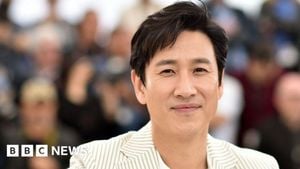The South Korean government is grappling with serious allegations of corruption affecting various officials and institutions. Recent reports have surfaced detailing questionable financial dealings involving some members of the government, leading to heightened scrutiny from watchdog organizations and growing public concern about the integrity of the nation's political framework.
These corruption allegations are not merely isolated incidents; they highlight systemic issues within governmental operations. Prominent figures implicated include both current and past officials, prompting calls for accountability across all levels of governance. The case is being closely monitored by the public and has sparked discussions around transparency and ethical conduct among politicians.
Kim Ho-sung, the spokesman for the anti-corruption watchdog, emphasized the urgency of the situation, stating, "The integrity of our institutions is at stake." This sentiment resonates with many citizens who feel increasingly disillusioned with their leaders. The South Korean public has long called for stringent measures to combat corruption, viewing it as detrimental to democratic processes.
President Lee Jae-myung addressed the nation, reaffirming the government’s commitment to addressing corruption. “We are committed to rooting out corruption at all levels of government,” he declared. This proclamation aims to restore faith among citizens who demand justice and reform, demanding both immediate and systemic changes.
Investigations are being spearheaded by the National Intelligence Service along with other law enforcement agencies. These efforts focus on various financial dealings and the possibility of undue influence by powerful entities within government corridors. The ramifications of these inquiries could be widespread, impacting not just careers but also the broader governance framework.
Public sentiment is heavily influenced by these developments. Many citizens are beginning to voice their frustrations, demanding not only accountability for those accused but also reforms to prevent future occurrences of similar misconduct. “This is not just about individuals but about restoring public trust,” noted Park Geun-hye, the former President, reflecting the collective desire for integrity within government.
These allegations forcefully recount tales of political intrigue, but they also expose the fragility of public trust. Investigative reports reveal troubling practices, leading to the conclusion among many citizens—change is overdue. Active measures taken by the government may pacify immediate concerns, but underlying frustration persists among the populace.
Members of the public are eager to see actionable changes as investigations progress. Calls for more rigorous oversight and governance reforms highlight the urgent need to address not only the alleged wrongdoings but also the conditions which allowed them to flourish. People are rallying for transparency and accountability to deter any semblance of corruption from taking root again.
This situation also sheds light on the struggles and challenges faced by politicians trying to maintain their credibility amid growing doubts. The South Korean parliament faces immense pressure to tailor responses reflective of the electorate's desires to thwart future allegations of misconduct.
Overall, this situation presents not only challenges for specific officials accused of misconduct but also the South Korean government as it navigates the path forward. The citizens have underscored their demand for transparent institutions, indicating clearly the threshold for tolerance concerning corruption has been crossed.
While the investigations proceed, the commitment to restoring public confidence remains imperative. Only through authentic engagement and institutional commitment can the government hope to divert criticism and rebuild trust within the community. This transformative process, as echoed by public figures and media analysts alike, could dictate the country's political stability and integrity going forward.



